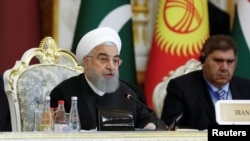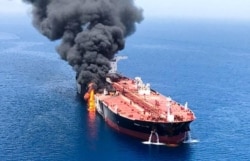Iranian President Hassan Rouhani says his country will continue to curtail its compliance with a nuclear deal unless other global powers that entered the agreement show "positive signals."
Iran began reducing its commitment to the pact in May after the United States unilaterally withdrew from the accord last year and imposed more sanctions on the Islamic Republic.
Speaking at a conference of Asian leaders in Tajikistan, Rouhani warned Tehran would "inevitably have to take more measures" if it doesn't get what it considers appropriate responses. "Obviously, Iran cannot stick to this agreement unilaterally," he declared.
Rouhani did not elaborate on what Iran would consider positive signs.
Rouhani's comments came as tensions between Iran and the U.S. continue to rise following Thursday's attacks on two oil tankers in the strategic waterway in the Gulf of Oman. The U.S. has accused Tehran of carrying out the attacks, a charge Iran has denied.
Rouhani spoke at the Conference on Interaction and Confidence Building Measures in Asia, which is attended by the other signatory countries of Britain, China, France, Germany and Russia.
Russian President Vladimir Putin said Moscow would comply with the agreement and called on the other signatories to do the same. "We believe that the only sensible decision is for all deal participants to honor our commitments," Putin told the conference.
U.S. pressure
The U.S. withdrew from a 2015 accord between Iran and world powers to curb Tehran's nuclear program in exchange for the lifting of sanctions.
The U.S. considers the agreement flawed and is trying to force Iran into new talks after reimposing crippling oil sanctions against the Islamic Republic and initiating a military buildup in the Persian Gulf region.
Iran responded in May with threats to resume an uranium enrichment program unless the other world powers that signed the accord protect Iran's oil and banking industries from the sanctions.
Tehran has accused the U.S. of destabilizing the region and maintains its nuclear program is peaceful and its missile development is for defense purposes.
France and other European signatories have said they want to preserve the agreement but many of their companies have canceled business deals with Tehran in response to pressure from the U.S.






